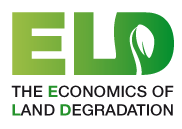With carefully designed policy support, economic instruments can help to reorient degraded rangelands towards more sustainable land management.
This is one of the conclusions of an article published in the Journal of Environmental Management, based on a case study of land degradation in the Kalahari rangelands of southwest Botswana that was funded by the Economics of Land Degradation (ELD) Initiative.
 January 2015: With carefully designed policy support, economic instruments can help to reorient degraded rangelands towards more sustainable land management. This is one of the conclusions of an article published in the Journal of Environmental Management, based on a case study of land degradation in the Kalahari rangelands of southwest Botswana that was funded by the Economics of Land Degradation (ELD) Initiative.
January 2015: With carefully designed policy support, economic instruments can help to reorient degraded rangelands towards more sustainable land management. This is one of the conclusions of an article published in the Journal of Environmental Management, based on a case study of land degradation in the Kalahari rangelands of southwest Botswana that was funded by the Economics of Land Degradation (ELD) Initiative.
According to the authors of the paper, titled ‘Reorienting land degradation towards sustainable land management: Linking sustainable livelihoods with ecosystem services in rangeland systems,’ conventional policies aimed at addressing bush encroachment – including some pilot initiatives under Botswana’s National Action Plan (NAP) for implementing the UN Convention to Combat Desertification (UNCCD) – have had mixed results because they have primarily focused on ‘biophysical assessments of degradation,’ at the farm or ranch scale.
Discussing a variety of studies examining the impact of past livestock production policies that prioritized fencing of land, based on livestock carrying capacities, the authors conclude that such ‘political lock-in’ to the privatization of rangeland areas “may be further worsening land degradation and deepening already pronounced social and economic inequalities,” by placing constraints on mobility by livestock producers and “compromising the possibility of the multiple uses of rangeland.”
By contrast, they argue, more promising policy experiments, such as ‘an alternative narrative’ to reduce land degradation based on sustaining livelihoods in common property land tenure regimes “have not yet been mainstreamed.”
The paper develops an integrated analytical framework that links an ecosystem services framework with sustainable livelihoods analysis to examine some of the costs, benefits and trade-offs associated with different ways of tackling land degradation. The framework is centered on “retaining critical levels of natural capital and finding ways of providing ecosystem services from that asset base.” Based on an exploration of the ‘shared, cultural and plural value’ of different sustainable land management (SLM) options, the authors suggest that through ‘deliberation,’ landscape scale changes in land management may occur, that are “consistent with actual preferences and more deeply held values of local communities.”
With regard to introducing payments for ecosystem services (PES) the authors caution, however, that given the complex tenure arrangements that exist in many rangeland areas, there is a danger that such economic policy instruments “may lead to unintended social justice concerns, in a similar way to the privatization of communal land since the 1970s in Botswana.” They note that PES mechanisms can “favor the supply of services for which there are markets” (such as climate regulation via carbon markets) over “those for which there is no market” (notably habitats for wildlife). They also argue that in the same way that privatization concentrated natural capital in the hands of the rich at the expense of poorer communal pastoralists, there is a danger that PES schemes will be more accessible with lower transaction costs for ‘richer’ landowning pastoralists, “who may capture the market before it is possible for communal pastoralists to organize them-selves sufficiently to enter the market-place.”
In conclusion, the authors emphasize that creating new markets for ecosystem services should be seen as just one among a number of policy instruments available to governments and call for “careful regulation” of such markets to prevent the provision of certain services at the expense of others. They also propose that one of the roles of government could be to ‘promote social capital’ among groups of communal pastoralists, “to enable them to access PES or agri-environment schemes and compete effectively with private landowners.” [Publication: Reorienting land degradation towards sustainable land management: Linking sustainable livelihoods with ecosystem services in rangeland systems] [Economics of Land Degradation Initiative Website]